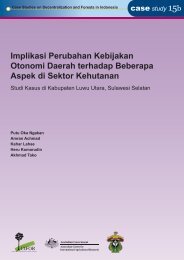Adaptive collaborative management of community forests in Asia ...
Adaptive collaborative management of community forests in Asia ...
Adaptive collaborative management of community forests in Asia ...
Create successful ePaper yourself
Turn your PDF publications into a flip-book with our unique Google optimized e-Paper software.
Chapter 4: Improv<strong>in</strong>g Forest Quality and Livelihoods <strong>in</strong> Indonesia • 125<br />
Preference about outcomes<br />
Agree<br />
Disagree<br />
Agree<br />
Computation<br />
<strong>in</strong><br />
bureaucratic<br />
structure<br />
Barga<strong>in</strong><strong>in</strong>g<br />
<strong>in</strong><br />
representative<br />
structure<br />
Beliefs about<br />
causation<br />
Disagree<br />
Judgment<br />
<strong>in</strong><br />
collegial<br />
structure<br />
plann<strong>in</strong>g<br />
settl<strong>in</strong>g<br />
CONFLICT<br />
Figure 4-6. Decision-mak<strong>in</strong>g structures for solv<strong>in</strong>g decision problems<br />
Source: Lee 1999, adapted from Thompson, J.D. and Tuden, A. 1959 Strategies, Structures<br />
and Processes <strong>of</strong> Organizational Decision. In: Thompson, J.D. (ed.) Comparative Studies <strong>in</strong><br />
Adm<strong>in</strong>istration. University <strong>of</strong> Pittsburgh Press. Repr<strong>in</strong>ted with permission <strong>of</strong> Lee.<br />
Our field experience supports Lee’s assessment: learn<strong>in</strong>g is essential for<br />
shift<strong>in</strong>g divergence or conflict <strong>in</strong> a complex, unstructured situation to<br />
a structurally manageable context. Learn<strong>in</strong>g enabled stakeholders to<br />
<strong>in</strong>teract more systematically and become better organised for mak<strong>in</strong>g<br />
collective choices. What is crucial, however (and here we go a step further<br />
than Lee), is the way learn<strong>in</strong>g contributes to more structured decision<br />
mak<strong>in</strong>g. Knowledge that is collectively constructed can <strong>in</strong>form jo<strong>in</strong>t<br />
decision mak<strong>in</strong>g. In contrast, ‘scientifically’ grounded knowledge <strong>in</strong> itself<br />
may have limited utility <strong>in</strong> real life because it does not necessarily lead to<br />
changes <strong>in</strong> people’s behaviour (Van Meegeren 1997), and the l<strong>in</strong>k between<br />
knowledge and behaviour is tenuous (Röl<strong>in</strong>g and Maarleveld 1999). In our<br />
ACM fieldwork, knowledge build<strong>in</strong>g is <strong>in</strong>serted <strong>in</strong>to social and political<br />
processes, encourag<strong>in</strong>g actors to act on newly acquired knowledge and<br />
adapt behaviours. Resource <strong>management</strong> knowledge—and specifically,<br />
understand<strong>in</strong>g causation <strong>in</strong> <strong>management</strong> problems—is no longer conf<strong>in</strong>ed<br />
to the realm <strong>of</strong> scientists but has become the doma<strong>in</strong> <strong>of</strong> stakeholders.
















